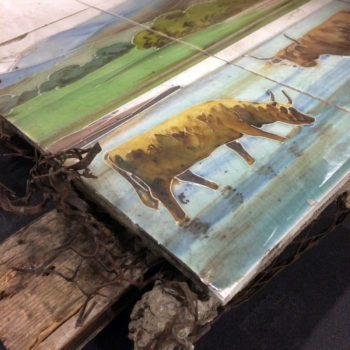
Thursday 27th September 2018 | 10.00-1.30pm |
Kelvin Hall, 1445 Argyle Street, Glasgow, G3 8AW
This half day event will focus on the history and conservation of ceramic tiles with particular reference to Glasgow. The session will include a look at the history of tile design together with practical examples of tile repair methods and conservation projects.
This event will take place at Kelvin Hall with access to the extensive tile collections managed by Glasgow Museums.
Dr Lindsay Lennie has a background in surveying and is an experienced researcher specialising in historic retail buildings. Lindsay edited the Tiles and Architectural Ceramics Society Journal for 4 years and has carried out research into Glasgow tile firm James Duncan Ltd who produced tiled shops throughout Scotland.
Darren McLean is a heritage building contractor with a breadth of experience in historic building conservation and repair. Frequently working with architects and surveyors, Darren is able to assist and advise on the correct use of materials and repair techniques.
All GCHT CPD sessions are recognised by the IHBC, and attendees can obtain a CPD certificate upon completion.
CPDs are OPEN TO ALL, whether you are an experienced practitioner, contractor, specifier, student, homeowner, or just keen to learn a bit more about the historic built environment. We look forward to meeting you.
£20 per person /£10 for students, including light lunch.
Interested in making your own tiles?
We have teamed up with Glasgow Ceramics Studio, and ceramic artist Alison Gray to lead us through a 4 week practical evening class in October 2018 where we will exploring tile design, decorative techniques, mould making and glazing methods. You can book your place here
[ESPRESSO_TICKET_SELECTOR event_id=11114]
This event will take place at Kelvin Hall, 1445 Argyle Street, Glasgow, G3 8AW. Please meet at the reception foyer for a prompt start.
By Bus:
Kelvin Hall is easily accessible by bus – visit the Traveline Scotland website for full details and journey planners.
By Car:
Kelvin Hall is situated on Argyle Street about 6 minutes from the M8. There is on street parking and a 114 space car park on Bunhouse Road where the following charges apply 0-4 hours £1 and 4-10 hours £2.50. There are blue badge spaces close to the entrance of Kelvin Hall on Bunhouse Road and on street parking where standard charges apply.
By Foot:
Kelvin Hall is situated opposite Kelvingrove Art Gallery and Museum and is easily accessible on foot. It is around 25 minutes walk from the city centre along Sauchiehall Street.
By Bicycle:
Kelvingrove Park forms part of the Kelvin Walkway, which links with the Glasgow Loch Lomond Clydeway and the West Highland Way. The venue can be easily reached by bicycle and parking is available.
By Train:
The closest station is Partick – exit the station, turn right and Kelvin Hall is a 12 minute walk along Dumbarton Road.
By Subway:
The closest station is Kelvinhall – exit the station, turn left and Kelvin Hall is a short 5 minute walk.
All sessions are recognised by the Institute of Historic Building Conservation (IHBC) as being capable of contributing to the obligatory CPD requirements of Full Members (see www.ihbc.org.uk)
